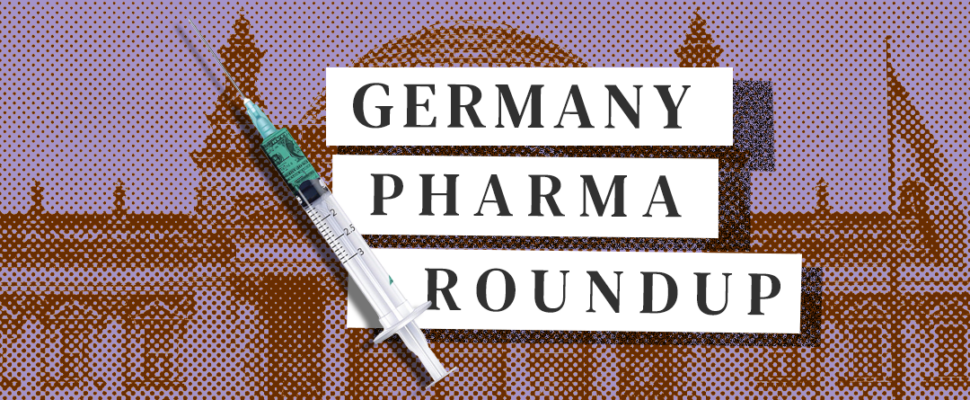The biggest pharma industry and healthcare stories from Germany, including the country’s legalisation of cannabis; the MASH potential of Boehringer Ingelheim’s obesity candidate; Bayer’s further share price drop and expansion into the US; the antibody-drug conjugate (ADC) specialist Tubulis’ series B2 financing, and Novartis’ deal with biotech MorphoSys.
Germany’s Merck sees return to organic earnings growth in 2024 (Reuters)
Lawsuit claims Boehringer misused US patents to delay asthma-drug rivals (Reuters)
German drugmaker Boehringer Ingelheim was accused in a federal lawsuit in Boston of improperly submitting patents to the U.S. Food and Drug Administration to delay generic competition and inflate prices for its lung disease drugs Combivent Respimat and Spiriva Respimat. The Massachusetts Laborers’ Health and Welfare Fund said in the lawsuit, that Boehringer misused several patents related to its Respimat inhaler to extend its monopoly on the drugs by up to 10 years, from 2020 to 2030.
Bayer shares fall nearly 6% on court order to pay $2.25 bln in damages (Reuters)
Boehringer’s Obesity Candidate Survodutide Shows Strong Potential in MASH (BioSpace)
Boehringer Ingelheim revealed new Phase II data for its investigational glucagon/GLP-1 receptor dual agonist survodutide, showing that it could elicit significant improvements in patients with metabolic dysfunction-associated steatohepatitis. Specific data from the announcement were sparse but the pharma revealed that at 48 weeks, 83% of patients treated with survodutide saw significant biopsy-proven improvement in metabolic dysfunction-associated steatohepatitis (MASH) without the worsening of their fibrosis stages, the study’s primary endpoint. By comparison, only 18.2% of placebo counterparts achieved this outcome.
Germany legalises possession of cannabis for personal use (The Guardian)
Germany’s parliament has passed a law allowing individuals and voluntary associations to grow and hold limited quantities of cannabis, making it the latest in a small group of countries and jurisdictions to legalise the drug, at least in part. The law passed by the chancellor, Olaf Scholz’s ruling three-party coalition, legalises cultivating up to three plants for private consumption, the possession of 50g of cannabis at one time at home, and 25g in public. It follows a heated debate about the pros and cons of allowing easier access to the drug.
Germany’s Ministry of Health refutes accusations of worsening market conditions (Pharmaceutical Technology)
Germany’s Federal Ministry of Health has published its evaluation report on the impact of the GKV Financial Stabilization Act on access to medicines in Germany, and on the operating conditions of the pharmaceutical industry in the country and the wider EU. It concluded that it was too early to posit any links between the GKV-FinStG and a worsening of access to medicines, or a deterioration on the operating conditions of pharmaceutical companies.
German biotech Tubulis raises €128m for ADC trials (Pharmaphorum)
Munich-based antibody-drug conjugate (ADC) specialist Tubulis has completed a sizeable Series B2 financing that shows sustained investor appetite for the ADC category, particularly for companies with technologies that can enhance the safety of these drugs. Tubulis has raised €128 million ($138 million) in the round, which will be used to move its lead solid tumour candidates TUB-030 and TUB-040 into clinical testing and expand the company with the creation of a US subsidiary. It follows a €60 million Series B in 2022 and a first round in 2020 that raised just under €11 million.
Novartis to buy German biotech MorphoSys for $2.9 billion (STAT)
Novartis said late Monday it has agreed to buy German biotech MorphoSys and its pipeline of cancer drugs for 2.7 billion euros, or $2.9 billion. The Swiss drugmaker will pay 68 euros, or around $73, per share, nearly twice Morphosys’s average trading price over the last month. At the center of the deal is pelabresib, a blood cancer pill that in November posted mixed results in a Phase 3 trial.
Bayer exec: U.S. is key in reviving beleaguered pharma’s drug pipeline (STAT)
German pharmaceutical company Bayer is expanding its US pharma business significantly, despite corporate turmoil and pricing pressures that have led many in the drug industry to bemoan the potential end of the American biotech innovation boom. Bayer’s C-suite has been on a soul-searching mission for the last year, spurred by new leadership and the realization that the company is, as new CEO Bill Anderson said earlier this month, “badly broken.”
C4 brings the Mercks to the yard, with Merck KGaA paying $16M to join protein degrader hunt (Fierce Pharma)
Apparently, C4 Therapeutics’ protein degradation tech brings all the Mercks to the yard. The Massachusetts biotech has signed on Merck KGaA in a $740 million biobucks partnership to find two degraders for cancer. Merck KGaA is offering $16 million upfront and $740 million in biobucks for the two degraders aimed at proteins that drive cancer growth. Merck will pay for C4’s discovery work and be responsible for future clinical development, according to Monday’s announcement. C4 also stands to make mid single- to low double-digit royalties should any of the targets turn into marketed drugs.



